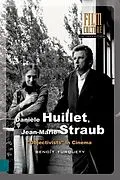Through a detailed analysis of the films of Straub and Huillet, the works they adapted, and Objectivist poems and essays, Benoît Turquety locates the impact of their work from a search for radical objectivity.
Autorentext
[Benoît Turquety](https://www.unil.ch/cin/fr/home/menuinst/collaborateurstrices/ancienn/turquety-benoit.html) is a professor in the film department at the University of Lausanne and director of the SNF research project on Bolex and amateur cinema. He is a founding member of the Material Archival Studies Network, and a member of the Dispositives research group, of the Network for Experimental Media Archaeology, and the Technology and the Humanities project.
Inhalt
INTRODUCTION PART ONE: FOUNDATIONSI. EROTIC BARBARITY: OTHON1. A Play, A Film2. Principles3. Tradition and OpacityII. OBJECTIVITY AND OBJECTIVITIES1. Huillet and Straub-style 'Objectivity'2. Objectivities3. The Objectivists: A History4. Objectivist Poetic TheoryPART TWO: LANGUAGE/AUTHORITYIII. THE POWER OF SPEECH (OR THE VOICE), OF SEEING AND THE PATH: MOSES AND AARON1. Moses, Aaron, Schoenberg, Huillet & Straub2. The Cinematic Form of (the Absence of) God: 'The Calling of Moses'3. Language Remains4. Birth of a Nation: Act II and End5. Objective on Objective: Huillet and Straub's PositionIV. SPEECH AGAINST POWER, OR POETRY, LOVE, AND REVOLUTION: 'A'-91. A Poem, History2. The Form of 'A'-93. Value and Meaning: Capitalism and Abstraction4. Love as a Poetic/Revolutionary TechniquePART THREE: INTERRUPTIONSV. CINEMA, POETRY, HISTORY: IMMOBILIZATIONS1. Introduction to Arnold Schoenberg's 'Musical Accompaniment to a Cinematographic Scene': Motion and Pause, Cinema as History2. From Ideogram to Fugue: Poetry/Cinema3. Interruptions4. Continuities5. History Without a Name6. Braiding, CuttingPART FOUR: TRIALS, SERIESVI. INDUSTRIAL CIVILIZATION FOR THE LAST TIME: CLASS RELATIONS1. Trials2. On SpaceVII. ON DISSOLUTION1. Speech Without Authority: The Death of Empedocles2. On Dismantling: Testimony and Workers, PeasantsCONCLUSIONINDEX
